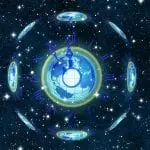[Originally published as the second part of When truth is slain in the streets]
Many people are avoiding reality by making misleading or distracting statements from the ultimate issue at hand: is Jesus truly the ONLY way, truth, and life (John 14:6; Acts 4:12), and are his commands good? (Psalm 119:33–57)
New Ager: “What we need is a ‘non-dualistic theological framework.’ We don’t need an either/or option. For example, in the Bible, Job’s friends were stuck thinking that only the righteous prosper and the sinful suffer. If his friends were really comforting, they would realize that what they really needed to do was to see things from a non-dualistic theological framework.”
Response: “I’m sorry, but I think you are committing several errors in reasoning here. On the one hand, you recognize that Job’s friends made a false dichotomy (only two options) on why Job is suffering, but then you conclude that since those two options are wrong, then there must be no truth at all.
“The error here is that there is an equivocation on the term ‘non-dualistic’ that confuses some readers to think that it may refer simply to ‘mystery.'” These two terms do not mean the same thing.
First, Let’s Define Some Terms
- Truth: That which corresponds to reality as God defines it (John 17:17; Ps 119:160).
- Contradiction: Something that claims to be true and not true in the same way and same relationship.
- Paradox: Something that at first glance appears to be a contradiction, but upon further investigation is, in fact, not a contradiction.
Mystery:
Something that is beyond comprehension, but is not a logical contradiction.
In the Bible, there are at least two main categories for mystery:
- Truths that were hidden in the Old Testament times but are now made known since the incarnation of Jesus (see Colossians 1:25-27) as described in the New Testament.
- Truths about God that are kept secret from us (Deut. 29:29) and that humans, as finite creatures, will never be able to fully understand. For example, the incarnation and Trinity are mysteries in that God has not revealed to us exactly how they are worked out. Regardless, we are able to apprehend the truthfulness of the incarnation from divine revelation, given to us in scripture, that Jesus is truly God and truly man yet one person. In the same way, we are able to apprehend the concept of the trinity that God is One what (his being) and three whos, namely, God the Father, God the Son, God the Holy Spirit.
Again, this makes sense, as the finite should not be able to fully grasp the infinite.
In fact, mystery should comfort us as we walk by faith (2 Corinthians 5:7). It is a mystery to me how exactly how “for those who love God all things work together for good, for those who are called according to his purpose” (Romans 8:38). However, it is comforting knowing that God is Sovereign over all things (Ephesians 1:11) in the world and is at work, especially when I am going through trials. In fact, those trials teach me to rely on him more (James 1:2-4).
Mystery, however, is VERY DIFFERENT from Non-dualistic thinking.
Non-Dualistic Thinking
This is the idea that we need to get rid of distinctions or dichotomies in reality. Psychiatrist Carl Jung called this the “liberation from opposites.” Hindus call it “Advaita” which means “not two” because of their belief in the oneness of everything. This is also known as pantheism (“all is one”) and the path towards enlightenment with new agers, gnostics, Buddhists, and Hindus is to alter your consciousness to accept this new “un-reality” that everything is one.
In fact, apologists Ron Carlson and Ed Decker explain these non-dualistic religions this way:
“The ultimate goal of Hinduism and Buddhism is to liberate ourselves from this “physical personal existence” and become One with the “impersonal All.” Hinduism and Buddhism teach that people are suffering in life because they have not liberated themselves from their personal world. It is the physical world, they say, that causes suffering. This is because the physical world is really just an illusion, called “Maya.” In order to get rid of suffering, you must rid yourself of this illusion of physical, personal existence. It is not the true reality. “True Reality” is supposedly the impersonal Brahman-Atman. Therefore, you must transcend this physical existence and be absorbed into this “true reality.” This is done by transcending this world of illusion by means of Yoga or Transcendental Meditation. You then become part of the Impersonal One, the Brahman-Atman. This is when you achieve “enlightenment” or Final Liberation.” (Fast Facts on False Teaching, Ron Carlson & Ed Decker, pg. 92)
The problem is that this view of reality is not a livable view.
Sadly, the former Christian artist, Michael Gungor, is now embracing this Hindu view of reality (see bel0w) that is just avoiding the key issue of evil and why Jesus came in the first place.
Jesus came to deal with our evil rebellion against our Creator. The cross of Christ IS the answer to the problem of evil. The good news is that God, in the person of Jesus, has shown us that he is NOT indifferent to evil. Jesus came to bear the full wrath of God the Father for our wickedness ( see Isaiah 53) that we deserved instead.
Yet Gungor talks about a non-dualistic view of reality that is contradictory and avoids the cross of Christ:
If there is no evil, then why does he want a world that is less violent? Is he making a distinction that violence is wrong? If so, then he is showing that his own worldview is unlivable and does not line up with reality.
Yet, THIS is the type of thinking that is being encouraged in the quote above on Job:
They need a non-dualistic theological framework.
Marcia Montenegro, a former New Ager, who now leads the ministry Christian Answers for the New Age, has written extensively on one of the most popular proponents of “nondualistic thinking”: Richard Rohr. She said that “I think Rohr’s use of ‘non-dual’ has caused people to think it means compassion and not judging or to not categorize.”
The person who wrote the comment about Job is assuming that irrational thought must be the only comforting answer since all of Job’s friends were wrong. Dr. Clay Jones, who has written extensively on difficult passages of the Bible, says that:
There is an arrogance when approaching scripture that says ‘if I don’t understand scripture, then it’s not even understandable.
How would a non-dualistic framework specifically help Job’s friends see the situation? How would telling Job, “Well, there isn’t really any good or evil” be of any comfort? It wouldn’t. It’s a cruel and empty thing to say.
If you don’t understand God’s ways, it doesn’t mean that you need to start thinking that God is just combining contradictory notions together.
This is what the non-reality and non-comfort that non-dualistic thinking offers: It sounds fancy and empathetic, but it’s really just a disconnect from reality that offers no hope at all.
At the end of Job, God responds to Job with an intense rebuke of several questions back to back.
R.C. Sproul describes God’s response to Job this way:
“In chapter 40, God says to Job finally, “Shall a faultfinder contend with the Almighty? He who argues with God, let him answer it” (v. 2). Now, Job’s response is not one of defiant demand for answers to his misery. Rather he says, “Behold, I am of small account; what shall I answer you? I lay my hand on my mouth. I have spoken once, and I will not answer; twice, but I will proceed no further” (vv. 4–5).
“And again God picks up the interrogation and goes even more deeply in the rapid fire interrogation that shows the overwhelming contrast between the power of God, who is known in Job as El Shaddai, and the contrasting impotence of Job. Finally, Job confesses that such things were too wonderful. He says, “I had heard of you by the hearing of the ear, but now my eye sees you; therefore I despise myself, and repent in dust and ashes” (42:5–6).
What is noteworthy in this drama is that God never directly answers Job’s questions. He doesn’t say, “Job, the reason you have suffered is for this or for that.” Rather, what God does in the mystery of the iniquity of such profound suffering is that He answers Job with Himself. This is the wisdom that answers the question of suffering — not the answer to why I have to suffer in a particular way, in a particular time, and in a particular circumstance, but wherein does my hope rest in the midst of suffering.
The answer to that comes clearly from the wisdom of the book of Job and agrees with the other premises of the wisdom literature: the fear of the Lord, awe and reverence before God, is the beginning of wisdom. And when we are befuddled and confused by things that we cannot understand in this world, we look not for specific answers always to specific questions, but we look to know God in His holiness, in His righteousness, in His justice, and in His mercy. Therein is the wisdom that is found in the book of Job.”
(Click here to read the full article by Dr. Sproul)
You don’t need a ‘non-dualistic framework.’ You need a God-centered framework that finds your ultimate hope and comfort in knowing Christ, who will never leave you nor forsake you (John 10:28–30). You need to understand that ALL of the Bible is pointing to our hope that is found in Jesus (Luke 24:25–27).
In fact, the apostle Paul says that “For no matter how many promises God has made, they are ‘Yes’ in Christ. And so through him the ‘Amen’ is spoken by us to the glory of God” (2 Corinthians 1:20). Christ dwelling within the believer and leading them through every trial is the greatest mystery that has now been revealed! Thus, like Job, you must continue to walk by faith in God, your redeemer, even when you don’t fully understand what is going on.
Ultimately, we must all decide to face the truth of who Christ is today or kneel in submission at his return (Philippians 2:10). For “it is appointed for man to die once, and after that comes judgment.” (Hebrews 9:27).
In the book of Isaiah, the prophet talks about how spiritually blind people can’t even discern what justice and truth are because the “truth has stumbled in the public squares and uprightness cannot enter” (Isaiah 59:14). Later in Romans 1:18, we understand that people suppress the truth in “unrighteousness” so they can worship something in creation instead of the Creator. This avoidance of truth is ultimately due to a belief that they don’t need atonement for sin, Jesus is not satisfying and worth surrendering their entire lives to and something else in creation is a better source of joy and authority for their life.
Yet, Jesus being the way, the truth, and the life is not a reality that you should want to ignore. He is the resurrected and reigning King of Kings who is Sovereign over all affairs of men (Hebrews 1:3; Romans 8). This should give you great comfort in the midst of our trials (2 Corinthians 1:3–4).
As the eternal God (John 1:1), he is the ultimate author of all Scripture (2 Timothy 3:16), and he affirms that everything is not divine, but only the triune God exists and He is separate from his creation (Deteurnomy 6:4; Is. 44:6).
Jesus says “whoever comes to me I will never drive away” (John 6:37b) and that he will always be with us (Matt 28:18) forever as His Spirit dwells in us when we are born again by trusting in Him (John 3:16-19; 6:29; Ephesians 1:13) and our guilt is forever washed away by Jesus’ payment for our sins (1 John 2:2) and we receive his perfect righteousness (2 Corinthians 5:21; Philippians 3:9).
So, look up from your phone and look up and away from all of your distractions from the truth of who Jesus is.
The greatest gift of the gospel is getting God.
God dwelling in you now (Colossians 1:27) and forever. Look to Jesus, the Prince of Peace and King of Glory. Look to your Maker.
I lift up my eyes to the mountains — where does my help come from? My help comes from the Lord, the Maker of heaven and earth. (Psalm 121:1–2)







